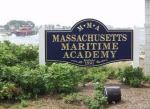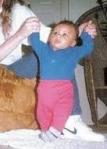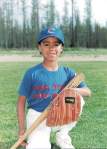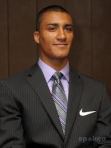Is Captain Richard Phillips an intrepid and courageous American, as proclaimed by President Obama in 2009? Or is he a reckless and irresponsible mariner, as many of his crew allege? And, can these questions be addressed by looking at his early life?
When I called Mrs. Virginia Phillips at her home in Florida earlier this year, she was tentative, but soon warmed up to talking about her son. Captain Phillips is back in the spotlight because renowned thespian Tom Hanks produced and starred in the title role of the movie, Captain Phillips. As you may already know, Phillips captained the MV Maersk Alabama when it was overtaken by pirates on April 8th, 2009 in the Gulf of Aden. Using cunning and ingenuity, the captain and his crew took back their ship. Phillips was captured and held on a lifeboat anchored a hundred yards from his mothership. A stand-off ensued; and when he attempted to escape, the pirates almost fatally shot him. Through incredible perseverance, he survived until he was rescued by the U.S. Navy on day five of his ordeal. Richard Phillips became a hero. President Obama echoed this sentiment, “I share the country’s admiration for the bravery of Captain Phillips and his selfless concern for his crew…His courage is a model for all.”
Mrs. Phillips enthusiastically described the movie as “a high adventure,” but it has its share of controversy. First is the lack of recognition for the Navy commander of the rescue team: A double minority, Michelle Howard would be a compelling heroine in any story, but was ignored in both Phillips’ memoir and the movie. The larger dispute has to do with nine crew members’ contention that Phillips exposed them to danger, which he vehemently denies. According to their lawsuit against his employer, Maersk Line and Waterman Steamship Corp, Phillips deliberately ignored several pirate warnings. NJ Newsday informs us the suit charges that, as Maersk and Waterman’s agent, Phillips was negligent: They “’had begged Phillips not to go so close,’ ‘He told them he wouldn’t let pirates scare him or force him to sail away from the coast’.” In a statement to ABC News, crewman Sagba asserts that at only 240 miles out, instead of the recommended 600 miles, “Phillips did not follow orders, the ship was attacked and he was responsible.” Indeed, Chief Engineer Mike Perry says, “He’s not a hero — he’s a villain.”
Phillips’ mother dismissed these accusations against her son as pure “jealousy and greed.” However, she deferred praise for having raised a hero, saying it was all his father’s influence: “Rich emulated his father. James was strong, intense and believed in hard work.” Yet in A Captain’s Duty, Richard extols his mom as “the proverbial glue that kept the family together…she kept the family balanced.” I asked Virginia what life was like in their house on Wilson Street in Winchester, MA. She painted a picture of a modest household with shared chores and a strict father. “He was tough on the kids,” she said ruefully, “but that was just the way it was back then.” Richard himself remembers his father as a person who “didn’t smother you with affection.” He jokes that living with James was “like growing up with Vince Lombardi in a bad mood.”
The Phillipses had eight children, divided equally by gender. Both taught; she, grade school, and he the local high school Rich attended — Business and Math while coaching basketball and football. Rich, an indifferent student, “[lurked] at the bottom of the class.” But the family’s codes of hard work and education were etched into the children from early on. Fights between the boys were resolved by their father, while Rich turned to his mom when he needed help with a problem or a warm hug. She taught them to love reading; his father taught them to “Do it right, do it once or not do it at all.” Though his father never coached him, sports were “the biggest thing” to him growing up. He gave up football to play the saxophone, (his mom proudly confirms he still plays) because he resented the discipline required. In spite of this, Phillips attributes sports to how he turned out, “I learned about life, about leaders and followers, by playing sports. Hell, I learned everything by playing sports.” Fiercely competitive, he and his brothers were always challenging each other. “I wanted to beat them at games just as much as they wanted to beat me. You competed among your friends, your street competed against the next street, and your school lived or died by who won the game.”
Back in the ’60s and ’70s, Irish neighborhoods in Boston had a reputation for teenage brawling, where boys (especially) were constantly challenged to be rough and tough. Richard and his brothers were no exception. Their mom recalls an easy, independent infant, who “did his own thing in his own laidback way;” growing into an adventurous, strong-minded teen. Accordingly, Richard admits he was something of a rambunctious wise-guy, prone to rebellion. Most evenings ended with him and his friends in fights or being thrown out of bars for carousing.
Richard’s boisterous lifestyle resulted in his dropping out of college. He spent a few months driving a cab until two chance encounters with merchant marines, plus a recommendation from his brother, Michael, propelled him toward the Massachusetts Maritime Academy. He describes “a year of constant hazing” in an institution where discipline and regimentation were required at all times. Richard remembers “It’s a true blue military school, where they broke you down before they build you into a merchant marine.” Of the 350 entrants who started with Phillips, only 180 men graduated. He succeeded because, “I was tough, I was a hard worker, and I knew how to learn.” Mrs. Phillips concedes that he came into his own at the MMA. He was ready – for life as an adult, and for life on the high seas.
Before she signed off, I asked Mrs. Phillips how she coped during his capture: She told me all she had were her faith, prayers and her belief that if anyone could emerge from this, it would be Rich. It was her confidence in her son’s character and training that kept her hopeful. According to The Guardian, she was “…sure it’s going to be OK. I know my son. He’s a survivor.” He himself said in his book’s introduction: “I should have told the pirates: I’m too stubborn to die that easily. You’re going to have to try harder.” Satisfied that she’d shared just enough with me, Mrs. Phillips had a smile in her voice as she said goodbye.
Alas, I was left with still more questions than answers. My conversations with Mrs. Phillips were shorter than my usual interviews, so I have drawn much of my material from Captain Phillip’s memoir; which confirmed Mrs. Phillips anecdotal musings, but also illuminates a more complicated persona. Flouting authority appears to be an innate part of Richard’s personality: He “was known for being someone who didn’t back down from a fight;” and seems to think “The need to wander [as a mariner] and the need to rebel go hand in hand.” In the book, Phillips come across as oft time confrontational, always pig-headed, inherently defiant, intensely competitive: Similarly, crew members separately describe him as arrogant, negligent, stubborn and difficult.
It may be that Phillip’s primary learning environments helped to produce the Captain Phillips these sailors describe: We know his dad never verbalized his love for him; we know he grew up in a neighborhood that spurs competitiveness; and we know his coming of age involved uncompromising militaristic training. Could these factors, coupled with an already intense personality, have sharpened his caustic independence to a perversely dangerous point? Many could argue that such dysfunctional conditions precipitated Phillips’ fateful pirate encounter.
On the other hand, one could also make a strong case that these very same circumstances fostered a hard worker with determination, leadership skills, a strong personality, self-confidence, and fearlessness. These, too, are all qualities for which Richard is known — he is “meticulous and highly competent,” as The New York Times learned. One does not, after all, become captain of a 17,000-ton cargo ship without having proved one’s mettle. Shashank Bengali of Mcclatchy Newspapers reported at the time, “Phillips wasn’t the easiest man to work for; “He’s in charge, and he wants you to know he’s in charge,” said Ken Quinn, a crew member. His weekly, taskmaster-style drills, however, probably saved them all.”
Personally, it is hard not to see Captain Phillips as a hero. He did survive five harrowing days as a captive. And it was under his shrewd command that the crew reclaimed the Alabama. (This is probably the only such successful case in modern history.) Things could have ended tragically different had Phillips not exercised his take-charge, fight-back attitude. What do you think? Is Captain Phillips a hero or a villain? And how do you think his upbringing figures into this?
















